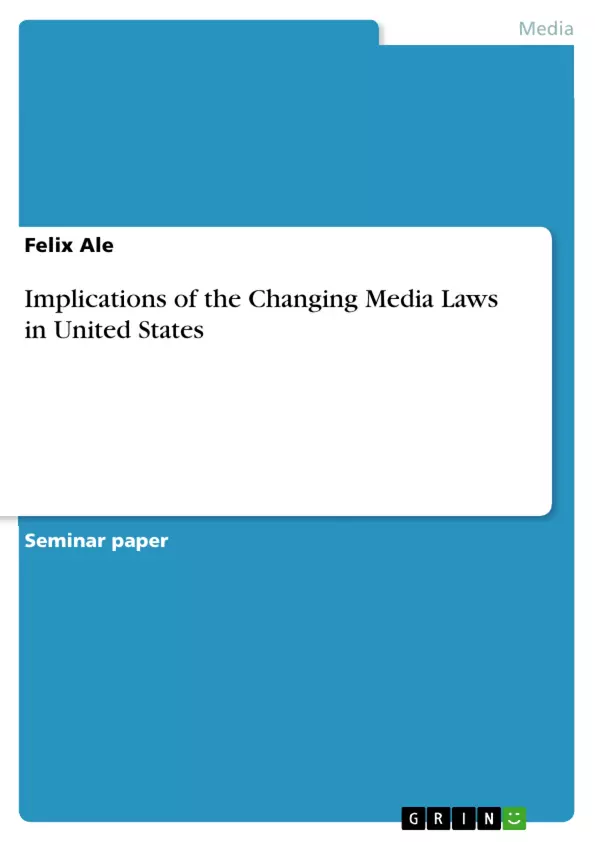The purpose of the media is to express an opinion supported by facts.In this process,media
houses have experienced conflicts with the courts.The law can,however handle such disagreements
through if the media houses intend to exist in the democratic media system.There are certain principles
that the media and the courts conflict over how they could be achieved.The media believe in independence,
meaning that,they should pursue their objectives without any pressure from the government or any groups,for
the benefit of their target audience.The principle of diversity also applies because the public is entitled to different
sources of information to meet the interest of different target groups.Diversity can also be achieved in form of information quality
because the information available to the people should be accurate,relevant and trustworthy.
Inhaltsverzeichnis (Table of Contents)
- Introduction
- Communication Law
- Changes in the Media Law
- Framework of Communication Law
- Fairness doctrine
- Normative media theories
- Prior Restraint
- Nationalism
- Open government
- Models of media regulation
- Emerging Issues and Laws
- Comparison of United States Media Laws with other Countries
- Critical Analysis
- Conclusion
- References
Zielsetzung und Themenschwerpunkte (Objectives and Key Themes)
The paper examines the evolving landscape of media laws in the United States, exploring the historical development of communication law and its implications for press freedom, government regulation, and the public's access to information. The paper aims to provide a comprehensive analysis of the legal framework that governs media operations and how it impacts the media's role in a democratic society.
- Freedom of the Press and its Legal Framework
- Evolution of Media Law in the United States
- Balancing Press Freedom with Government Regulation
- Impact of Media Law on Information Access and Diversity
- Comparison of Media Laws in the United States with Other Countries
Zusammenfassung der Kapitel (Chapter Summaries)
The introduction highlights the importance of press freedom, diversity, and accuracy in a democratic society. The paper discusses the conflicting principles of media freedom and government regulation, particularly regarding the protection of minority interests. The chapter lays the groundwork for exploring how communication law attempts to address these conflicts.
The chapter on communication law focuses on the Communications Act of 1934, which regulates wire communications and includes regulations on the internet, telecommunications, cable TV, and satellite communications. The chapter discusses the Act's provisions for spectrum management, market regulation, content control, and protection of new entrants. It also highlights the role of the Federal Communications Commission (FCC) in enforcing these regulations.
The chapter discussing changes in media law outlines significant legislative changes that have shaped the media landscape in the United States. It covers the Communications Assistance for Law Enforcement Act, the Cable Communications Act of 1984, the Cable Television Consumer Protection and Competition Act, and the Telecommunications Act of 1996. These laws reflect the evolving technological landscape and the need to balance competition, consumer protection, and government oversight.
The chapter on the framework of communication law delves into various doctrines that underpin the legal framework of the communications industry. It focuses on the fairness doctrine, a policy introduced in 1949 by the FCC to ensure balanced coverage of controversial issues. The chapter also discusses other key principles, such as prior restraint, nationalism, open government, and models of media regulation. It illustrates these principles through relevant court cases and examples.
Schlüsselwörter (Keywords)
The paper focuses on key terms and concepts related to media law, including press freedom, government regulation, communications law, the Communications Act of 1934, the Fairness Doctrine, prior restraint, nationalism, open government, and models of media regulation. It explores the intersection of these themes in the context of the United States, examining how they impact the media's role in a democratic society.
- Arbeit zitieren
- Felix Ale (Autor:in), 2014, Implications of the Changing Media Laws in United States, München, GRIN Verlag, https://www.hausarbeiten.de/document/287134


